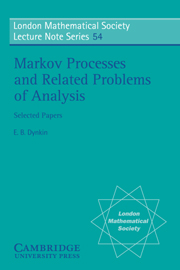Book contents
- Frontmatter
- Contents
- Preface
- I Markov processes and related problems of analysis (RMS 15:2 (1960) 1–21)
- II Martin boundaries and non-negative solutions of a boundary value problem with a directional derivative (RMS 19:5 (1964) 1–48)
- III Boundary theory of Markov processes (the discrete case) (RMS 24:2 (1969) 1–42)
- IV The initial and final behaviour of trajectories of Markov processes (RMS 26:4 (1971) 165–185)
- V Integral representation of excessive measures and excessive functions (RMS 27:1 (1972) 43–84
- VI Regular Markov processes (RMS 28:2 (1973) 33–64)
- VII Markov representations of stochastic systems (RMS 30:1 (1975) 65–104)
- VIII Sufficient statistics and extreme points (Ann. Prob. 6 (1978) 705–730)
- IX Minimal excessive measures and functions (Trans. AMS 258 (1980) 217–244)
VI - Regular Markov processes (RMS 28:2 (1973) 33–64)
Published online by Cambridge University Press: 18 March 2010
- Frontmatter
- Contents
- Preface
- I Markov processes and related problems of analysis (RMS 15:2 (1960) 1–21)
- II Martin boundaries and non-negative solutions of a boundary value problem with a directional derivative (RMS 19:5 (1964) 1–48)
- III Boundary theory of Markov processes (the discrete case) (RMS 24:2 (1969) 1–42)
- IV The initial and final behaviour of trajectories of Markov processes (RMS 26:4 (1971) 165–185)
- V Integral representation of excessive measures and excessive functions (RMS 27:1 (1972) 43–84
- VI Regular Markov processes (RMS 28:2 (1973) 33–64)
- VII Markov representations of stochastic systems (RMS 30:1 (1975) 65–104)
- VIII Sufficient statistics and extreme points (Ann. Prob. 6 (1978) 705–730)
- IX Minimal excessive measures and functions (Trans. AMS 258 (1980) 217–244)
Summary
This article is concerned with the foundations of the theory of Markov processes. We introduce the concepts of a regular Markov process and the class of such processes. We show that regular processes possess a number of good properties (strong Markov character, continuity on the right of excessive functions along almost all trajectories, and so on). A class of regular Markov processes is constructed by means of an arbitrary transition function (regular re-construction of the canonical class). We also prove a uniqueness theorem.
We diverge from tradition in three respects:
a) we investigate processes on an arbitrary random time interval;
b) all definitions and results are formulated in terms of measurable structures without the use of topology (except for the topology of the real line);
c) our main objects of study are non-homogeneous processes (homogeneous ones are discussed as an important special case).
In consequence of a), the theory is highly symmetrical: there is no longer disparity between the birth time α of the process, which is usually fixed, and the death time β, which is considered random.
Principle b) does not prevent us from introducing, when necessary, various topologies in the state space (as systems of coordinates are introduced in geometry). However, it is required that the final statements should be invariant with respect to the choice of such a topology.
Finally, the main gain from c) is simplification of the theory: discarding the “burden of homogeneity” we can use constructions which, generally speaking, destroy this homogeneity.
Similar questions have been considered (for the homogeneous case) by Knight [8], Doob [2], [3] and other authors.
- Type
- Chapter
- Information
- Markov Processes and Related Problems of Analysis , pp. 187 - 218Publisher: Cambridge University PressPrint publication year: 1982

